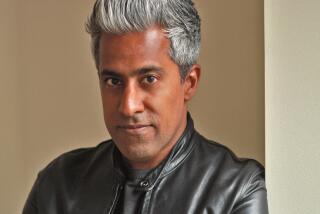COLUMN LEFT/ ELAINE CIULLA KAMARCK : Bush May Be Smart to Drop ‘Change’ Line : The public wasn’t buying his attempt to look sharp; comfy conservatism has proved its appeal in uncertain climes.
- Share via
Over the past few weeks it has been almost painful to watch President Bush. As his campaign lurches from crisis to crisis, Bush has tried to explain himself and his record to the American public.
So far the public remains unconvinced, and no wonder. There is something unbelievable about having a 68-year-old conservative try to make himself out to be the agent of change, and there is something humiliating about a President of the United States blaming every problem of the country on the Congress of the United States. Bush told the USA Today editorial board, “I’m not inclined to blame others when things are going tough.” But that is exactly what he has been doing.
Thus far, George Bush’s message has been beneath him, and he seems to know it. You can sense it in the way his voice goes up an octave and his tongue gets tied whenever he has to deliver a line that he knows is faintly ridiculous. In the space of the same interview or the same speech, he can go from being a shifty-eyed whining dweeb to a master of the universe, depending on what he’s saying. Unlike his predecessor, he is not an actor. If he doesn’t abelieve in what he’s talking about, we can see it instantly.
The exception that proves the rule occurred at a rally in Jacksonville, Fla., the other day. Most press reports played it as a welcome positive event in an otherwise dismal campaign swing. Yes, the sun was shining, the crowd was enthusiastic and the pictures colorful, and two days later Bush was still referring to the success of that rally. But the most important part of the day was his message, delivered in the clear, strong tones that we usually only get from Bush when he is talking about war with Iraq.
Instead of trying to drape himself in the mantle of change, Bush attacked the notion of change itself and articulated the central defining notion of conservative politics everywhere: that individuals, not government, are the true and proper source of change in society. In a litany interrupted repeatedly with applause, Bush put himself on the side of parents, not government, when it comes to schools; parents, not government, when it comes to child care; and people, not government, when it comes to finding a doctor.
Instead of trying to convince us that he has a large domestic agenda that the Democratic Congress has blocked, Bush articulated a philosophy that is deeply and fundamentally skeptical of government’s ability to make things better. This is the position of a classic conservative.
Those of us who toil on the other side of the fence persist in believing that government can be a force for change. But we also have to remember that stability has a powerful electoral appeal, and that the tendency to distrust bureaucracy and government is a recurrent motif of Information Age politics.
So it is no wonder that in the White House these days there is a fondness for analogies to the British election that took place this past spring. In that vote for Parliament, an exhausted and hapless political party--the Conservatives--ran a mess of a campaign in the midst of a recession and continued bad economic news. They lagged behind in the polls but, in the end, won. The Labor Party rode the desire for change until the last week, when they saw their lead in the polls disappear amid fear on the part of suburban voters that the uninspiring status quo was better than the kind of change likely to come from the Labor Party. Two big issues, taxes and reform of the national health insurance bureaucracy, eventually worked against Labor.
Bill Clinton should pay attention to the British elections as well, especially as he flirts with potentially disastrous steps like changing his position in favor of the North American free-trade agreement, a move that could well leave him open to Republican attacks that his is the same old Democratic Party--beholden to special-interest groups.
Change, as Neil Kinnock found out, can turn out to be a theme that is more frightening than reassuring. This week, George Bush found that fear of change is the only message he can deliver well.
More to Read
Get the L.A. Times Politics newsletter
Deeply reported insights into legislation, politics and policy from Sacramento, Washington and beyond. In your inbox twice per week.
You may occasionally receive promotional content from the Los Angeles Times.










